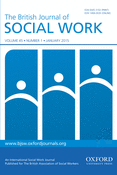-
Views
-
Cite
Cite
Yochay Nadan, Galia Weinberg-Kurnik, Adital Ben-Ari, Bringing Context and Power Relations to the Fore: Intergroup Dialogue as a Tool in Social Work Education, The British Journal of Social Work, Volume 45, Issue 1, January 2015, Pages 260–277, https://doi.org/10.1093/bjsw/bct116
Close - Share Icon Share
Abstract
The aim of this research was to examine the unique contribution of intergroup dialogue encounters, held in an international context, to multicultural social work education. We conducted a qualitative study based on fifteen in-depth interviews with Israeli social work students who had participated in a German–Israeli intergroup encounter. The analysis yielded two main themes: a movement between different viewpoints, and a reflection on categories of difference and collective narratives. Our findings indicate that intergroup encounter fosters critical reflectivity on two main interwoven constructs that are especially relevant to multicultural social work education—contextuality and power relations. This is achieved through four dynamic processes in intergroup encounter: shifting from deductive to inductive reasoning, from an essentialist to a constructivist perception, from focusing on the ‘other’ to inquiring about ourselves, and experiencing intersectionality. International intergroup encounters can therefore contribute to professional efforts to educate critical, reflective and socially committed practitioners, and can help to meet the challenges of working in contemporary societies characterised by growing diversity, intergroup tensions, ethnic and political conflicts.




